#techforgood
Explore tagged Tumblr posts
Text
Zylentrix: Your Global Consultancy Partner in Education, IT Services, Recruitment & Business Consulting
Welcome to Zylentrix – Shaping Talent, Technology, & the Future.
Zylentrix is your go-to partner for IT services, business consulting, recruitment solutions, and education consultancy. Our mission is to empower businesses, professionals, and students by providing innovative, tailored solutions that drive success in a rapidly evolving world.
On this platform, we dive deep into topics ranging from the latest tech trends to effective business strategies, recruitment best practices, and educational guidance. Whether you're looking to streamline your business operations, recruit top talent, or navigate your educational journey, Zylentrix is here to help you shape the future.
Stay tuned for insightful articles, expert opinions, and thought leadership content that will inspire you to grow and succeed!
#Zylentrix#ShapingTheFuture#FutureOfWork#InnovationInAction#ITServices#BusinessConsulting#RecruitmentSolutions#EducationConsultancy#TechTrends#DigitalTransformation#BusinessGrowth#TalentDevelopment#CareerGuidance#StudentSuccess#NextGenLeaders#HireSmart#LearnAndGrow#TechDrivenFuture#Empowerment#LeadershipMatters#SuccessMindset#EdTech#HRTech#CareerGoals#TechForGood
22 notes
·
View notes
Text
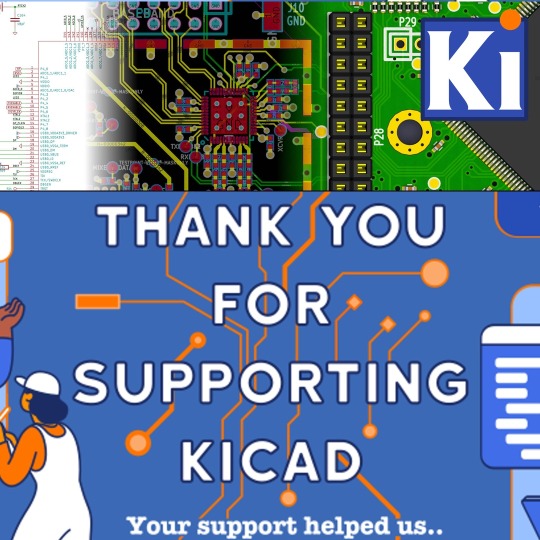
Giving Tuesday – KiCad open-source design #GivingTuesday 💻🔧🌍❤️🤝
KiCad is an open-source software suite for electronic design automation (EDA), enabling users to design schematics and printed circuit boards (PCBs). KiCad is a great, free, open tool for creating complex designs, from hobbyist projects to professional-grade hardware. As an open-source initiative, KiCad promotes accessibility and collaboration, making advanced EDA tools freely available. Supporting KiCad helps the development of features, bug fixes, and community-driven improvements, empowering engineers, educators, and hobbyists worldwide. Consider donating to KiCad to strengthen the open-source hardware community and help make high-quality EDA tools accessible to everyone.
In the past year, they posted this nifty chart that shows what your support can help accomplish.

If KiCad is valuable to you, please consider donating to help make it even better.
#kicad#kicadpcb#electronics#eda#schematic#pcbdesign#pcblayout#opensource#edatools#openhardware#donatetoday#engineeringdesign#communitysupport#openedsystems#opensourcecommunity#pcbtools#givingback#generositymatters#techforgood#makercommunity#electronicsdesign#designsoftware#kicaddonation#hardwaredesign#opensourceinitiative#techcommunity#sharekindness
11 notes
·
View notes
Text

AI in agriculture is helping farmers plan smarter and reduce waste, making way for a more sustainable future.
Agritech is growing fast, and we’re just getting started! Stay tuned for more updates on how AI is changing the game in farming.
Curious about how AI can benefit your farm? Let’s connect and chat: https://www.pranathiss.com
7 notes
·
View notes
Text
Hacktivism: Digital Rebellion for a New Age 🌐💥
In an era where our lives are intertwined with the digital landscape, the concept of hacktivism has become more than just a buzzword. It’s the fusion of hacking and activism—where people use their coding and cyber skills to disrupt power structures, challenge injustice, and amplify voices that often go unheard. It's a rebellion born from the belief that access to information, privacy, and freedom are rights, not privileges. But how did this digital resistance movement come to be, and how can you get involved? Let’s dive into it. 💻⚡️
What Exactly Is Hacktivism? 🤖✨
At its core, hacktivism is activism with a digital twist. It’s about using technology and hacking tools to advance social, political, and environmental causes. The most common methods include:
DDoS Attacks (Distributed Denial of Service): Overloading a target’s website with too much traffic, essentially crashing it, to temporarily shut down an online service.
Website Defacement: Replacing a website’s homepage with a political message, often exposing corruption or unethical practices.
Data Leaks: Exposing hidden documents or sensitive information that reveal corporate or governmental wrongdoing.
Bypassing Censorship: Circumventing firewalls or government restrictions to make sure information reaches the people it needs to.
The idea is simple: when a government or corporation controls the narrative or hides the truth, hacktivists take it into their own hands to expose it. 🌍💡
Why Is Hacktivism Important? 🔥
In a world dominated by corporations and powerful governments, hacktivism represents a form of resistance that’s accessible. It’s about leveling the playing field, giving people—especially those who lack resources—an avenue to protest, to expose corruption, and to disrupt systems that perpetuate inequality. The digital world is where much of our lives now happen, and hacktivism uses the very systems that oppress us to fight back.
Think about WikiLeaks leaking documents that exposed global surveillance and the activities of intelligence agencies. Or how Anonymous has played a pivotal role in advocating for free speech, standing up against internet censorship, and exposing corrupt governments and corporations. These are the digital warriors fighting for a cause, using nothing but code and their knowledge of the web.
Hacktivism is a direct response to modern issues like surveillance, censorship, and misinformation. It's a way to shift power back to the people, to give voice to the voiceless, and to challenge oppressive systems that don’t always play by the rules.
The Ethical Dilemma 🤔💭
Let’s be real: hacktivism doesn’t come without its ethical dilemmas. While the intentions are often noble, the methods used—hacking into private systems, defacing websites, leaking sensitive info—can sometimes lead to unintended consequences. The line between activism and cybercrime is thin, and depending on where you live, you might face serious legal repercussions for participating in hacktivist activities.
It’s important to consider the ethics behind the actions. Are you defending the free flow of information? Or are you inadvertently causing harm to innocent bystanders? Are the people you’re exposing truly deserving of scrutiny, or are you just participating in chaos for the sake of it?
So if you’re thinking of getting involved, it’s crucial to ask yourself: What am I fighting for? And is the harm done justified by the greater good?
How to Get Started 💻💡
So, you’re interested in getting involved? Here’s a starting point to help you use your tech skills for good:
Learn the Basics of Hacking 🔐: Before diving into the world of hacktivism, you'll need to understand the tools of the trade. Start with the basics: programming languages like Python, HTML, and JavaScript are good foundational skills. Learn how networks work and how to exploit vulnerabilities in websites and servers. There are plenty of free online resources like Codecademy, Hack This Site, and OverTheWire to help you get started.
Understand the Ethical Implications ⚖️: Hacktivism is, above all, about fighting for justice and transparency. But it’s crucial to think through your actions. What’s the bigger picture? What are you trying to achieve? Keep up with the latest issues surrounding privacy, data rights, and digital freedom. Some online groups like The Electronic Frontier Foundation (EFF) provide great resources on the ethics of hacking and digital activism.
Join Communities 🕸️: Being part of a like-minded group can give you support and insight. Online communities, like those on Reddit, Discord, or specific forums like 4chan (if you're cautious of the chaos), can help you learn more about hacktivism. Anonymous has also had an iconic role in digital activism and can be a place where people learn to organize for change.
Stay Informed 🌐: To be effective as a hacktivist, you need to be in the know. Follow independent news sources, activist blogs, and websites that report on global surveillance, corporate corruption, and governmental abuse of power. Hacktivism often reacts to injustices that would otherwise go unnoticed—being informed helps you take action when necessary.
Respect the Digital Space 🌱: While hacktivism can be used to disrupt, it’s important to respect the privacy and safety of ordinary people. Try to avoid unnecessary damage to private citizens, and focus on the systems that need disrupting. The internet is a tool that should be used to liberate, not to destroy without purpose.
Never Forget the Human Side ❤️: As with all activism, the heart of hacktivism is about making a difference in real people’s lives. Whether it's freeing information that has been hidden, protecting human rights, or challenging unjust power structures—always remember that at the end of the code, there are humans behind the cause.
Final Thoughts 💬
Hacktivism is a powerful, transformative form of resistance. It’s not always about flashy headlines or viral attacks—often, it’s the quiet work of exposing truths and giving people a voice in a world that tries to keep them silent. It’s messy, it’s complex, and it’s not for everyone. But if you’re interested in hacking for a purpose greater than yourself, learning the craft with the intention to fight for a better, more just world is something that can actually make a difference.
Remember: With great code comes great responsibility. ✊🌐💻
#Hacktivism#DigitalRevolution#TechForGood#Activism#CodeForJustice#ChangeTheSystem#Anarchism#Revolution
9 notes
·
View notes
Text
🤖✨ Happy National Artificial Intelligence Day!
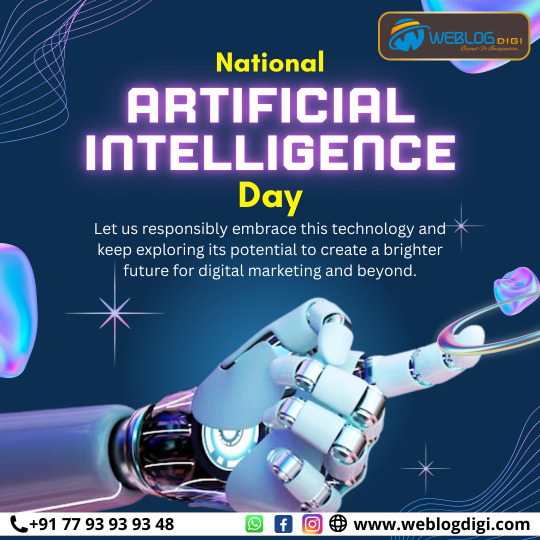
Today we celebrate the innovations shaping our future. From smarter marketing to powerful automation — AI is transforming the way we work, connect, and grow. 🌐
Let’s continue embracing this game-changing technology responsibly to unlock new possibilities in digital marketing and beyond. 💡
🔹 The future is now. The future is AI. 🔹 Brought to you by Weblog Digi – Expert in AI-Driven Marketing Solutions.
#AIday2025#artificialintelligence#AIinmarketing#digitalinnovation#techforgood#futurewithai#weblogdigi#smartmarketing#AIrevolution#embracetechnology#digitalmarketingtrends#AIempowers#innovationday#AIfutureready#marketingwithAI#socialmediamarketing#digitalmarketing#marketingtips#creativemarketing#webdesign#business#contentmarketing#contentstrategy#seo
4 notes
·
View notes
Text
How Ahmed Bakran Transforms Ideas into Impactful Stories
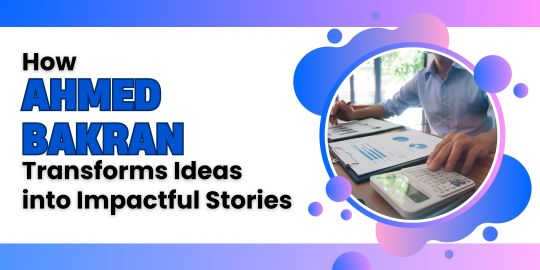
Today, there are a lot of ideas, but not many people who put them into action. Ahmed Bakran stands out as a master maker of change. He doesn't just come up with business ideas; he turns them into stories that have meaning, inspire people, and have an effect that can be measured.
Bakran is an American businessman, engineer, and investor who has made a name for himself in many fields. Software advice, foreign employment, niche job sites, real estate development, and non-profits are just some of the businesses he has started or helped start. All of these businesses began with a simple idea. They were strong stories of growth, connection, strength, and change, but Bakran turned them into powerful ones.
How does he do it? How does he turn simple ideas into things that matter in the real world? He has a special mix of vision, strategy,
understanding, and technical skill that makes him the best person for the job.
1. He Starts With a Problem Worth Solving
Every story with an effect has a problem at its core. He doesn't start with fads; he starts with real issues. He looks for problems that other people miss, like how inefficient it is to hire people from other countries, how niche job seekers aren't seen, or how standard real estate models don't serve certain areas well.
Bakran doesn't ask, "What can I build?" He asks, "What needs to change?" He can see opportunities where others see problems because of the way he thinks.
His ideas are real because they are based on this basic truth. When an answer has deep roots in a problem that affects people, the story that follows is naturally interesting.
2. He Uses Technology as a Narrative Engine
Bakran is a seasoned engineer who doesn't just see code as code. He sees it as the framework that makes the story possible. His small software consulting company wasn't started just to make apps; it was started to help businesses bring their processes up to date and become more efficient.
Through his niche job boards and employment businesses, he used technology to bring people together from different places, skill levels, and cultures. It wasn't just websites; these were places where stories could be told. Each job situation that went well was its own personal success story. Each hire helped a business grow or come up with new ideas.
Bakran moves the story along with data, design, and tools. Tech to him is not a product but a story device that helps people find answers.
3. He Builds Teams That Believe in the Vision
Bakran knows that ideas can't grow without people. One important part of turning ideas into stories that is often ignored is the ability to bring people together and motivate them. Bakran spends time with people who share his belief in making a difference for the long term, not just for the short term.
He carefully builds a culture of ownership and understanding in everyone, from technical teams to real estate producers to charity leaders. The people on his team don't just have jobs; they also have parts in a bigger story that they can be proud of.
One of the main reasons his businesses stay honest and grow over time is that he can get people to work together toward a shared goal.
4. He Balances Structure with Flexibility
Every good story needs a plot, but it also needs room to grow. Bakran thinks about his projects like an editor would. He creates robust business plans, roadmaps, and objectives, but also leaves room for adaptation and learning.
For example, in his foreign hire business, he established processes that could be scaled to handle hiring people worldwide while remaining adaptable to local needs and economic changes.
His ideas stay useful even as the market changes because he has a focused but flexible mind. It makes sure that his stories don't end well but keep getting better and more powerful over time.
5. He Measures Impact, Not Just Output
Too many business owners stop at getting things done. Bakran goes even further; he checks the effect. He makes sure that every project leaves a measured mark, whether it's on the lives of thousands of people through non-profit work or on the neighborhoods that are changed by real estate growth.
Bakran thinks that an idea is good even if it doesn't make money. It's one that makes life better. For example, he runs his charities with the same
level of focus as he runs his businesses. They're not meant to help, but to bring about change.
Every big event can be used to tell a story: a job that helped a family, a building that made a neighborhood better, or a grant that changed the future of a student.
6. He Embeds Empathy in Every Venture
In the end, what makes Ahmed Bakran's stories powerful is that they are about real people. There is always someone being helped, a barrier being broken, or a voice being heard behind the code, the cash, and the contracts.
He has started non-profits that give impoverished areas more power. He has helped talented people from poor countries get jobs by hiring them from other countries. He has built homes and businesses that make people's lives better.
This focus on people comes from the heart of his business. And that heart is what makes business success important to society.
From Vision to Legacy: The End
It's not luck or even just cleverness that helps Ahmed Bakran turn ideas into powerful stories; it's his purpose. He thinks of each thought as the start of a story, and he writes that story with planning, understanding, and never-ending action.
He always follows the same steps: start with a purpose, build a structure, and produce with ethics, whether he's making a tech answer, a social project, or infrastructure. As a result? Projects that matter. Long-lasting stories.
We live in a world that loves big launches and popular trends, but Bakran offers something deeper. He reminds us that the most powerful ideas are those that become stories of real-world change. And the story goes on with every project he works on.
2 notes
·
View notes
Text
The Rise of the AI Anxieties
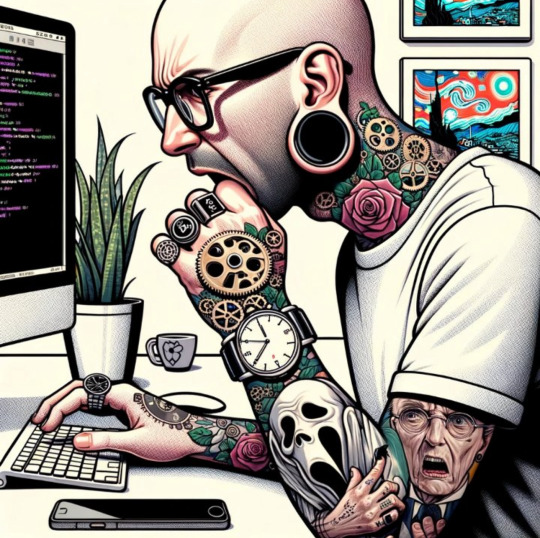
We are living through a unique cultural moment where the discourse around Artificial Intelligence is becoming increasingly polarized. On one side, there's unbridled optimism; on the other, a deep-seated fear that manifests as everything from legitimate ethical critique to outright hostility towards its users. Concerns about its environmental impact, the centralization of corporate power, privacy, and worker displacement are not just valid; they are critical challenges society must navigate.
However, history is filled with examples of transformative technologies that sparked similar fears. The printing press threatened the scribe's livelihood, the factory threatened the artisan's, and the digital camera was seen by some as the death of "true" photography. Yet, in each case, the technology ultimately created more opportunity, more wealth, and more creative potential than it destroyed. The question, then, is not whether AI has potential downsides, but whether its potential upsides for the vast majority of people outweigh them. This is precisely where the ethical framework of utilitarianism becomes so useful.
A Brief History of the "Greatest Good"
Utilitarianism as a formal school of thought emerged during the 18th and 19th centuries, most famously with the philosophers Jeremy Bentham and John Stuart Mill. At its core, it is a form of consequentialism—meaning it judges an action's morality based on its results or consequences.
The guiding principle is simple and profound: the most ethical choice is the one that will produce the greatest good for the greatest number of people.
Crucially, utilitarianism was a progressive and revolutionary philosophy. Its proponents advocated for social reforms like the abolition of slavery, women's suffrage, and the decriminalization of homosexuality because they correctly calculated that these changes would vastly increase the total sum of human well-being and decrease suffering. It is a philosophy of forward momentum, focused on building a better future for all.
The Utilitarian Case for Embracing AI
Applying the principle of utilitarianism to AI, we are ethically compelled to weigh the total potential happiness against the potential suffering. While the risks are real and must be mitigated, the potential benefits are staggering in scale and scope.
AI is poised to revolutionize healthcare, a primary source of global suffering, by amplifying human health and longevity. Its models can drastically accelerate drug discovery and improve diagnostics by detecting diseases from medical scans with superhuman accuracy, making early screening more accessible and effective. From a utilitarian view, contributing to even one major cure would create an incalculable reduction in suffering.
Beyond health, AI provides a new class of tools to address humanity's most complex global challenges.
The massive data centers required to train AI models contribute to global emissions, but this challenge does not negate AI's potential. Instead, it frames the utilitarian objective: to leverage AI to create environmental efficiencies that far outweigh its own energy costs. It can help mitigate climate change by optimizing energy grids for renewables, bolster food security through precision agriculture, and aid disaster relief by analyzing satellite imagery. The goal is to ensure that the combined utility of a more stable climate, a secure food supply, and effective crisis response is a clear net positive for humanity.
Democratizing Access and Opportunity
Furthermore, AI acts as a powerful lever for democratizing opportunity, creativity, and productivity. This democratization is especially profound when considering accessibility, a point often lost in mainstream critiques. Many arguments against AI are framed from a neurotypical and able-bodied perspective, inadvertently dismissing the transformative power these tools represent for millions. For individuals with learning disabilities, AuDHD, or other forms of neurodivergence, AI serves as a vital accessibility tool. It directly supports users by acting as an executive function aid, a text-to-speech reader, or a way to organize and process information into knowledge. In this context, AI isn't a shortcut that undermines "real" work; it's an indispensable support that makes it possible in the first place.
This support extends profoundly to individuals with physical disabilities. For the blind and those with low vision, AI-powered apps can narrate the visual world through a phone’s camera, describing objects, reading text, and even recognizing faces. For the deaf and hard of hearing, AI provides real-time captioning of conversations and can power hearing aids that intelligently isolate voices from background noise. Beyond sensory assistance, AI is revolutionizing mobility. It drives smart prosthetics that learn and adapt to a user's movements for more natural control, and it enables voice-command systems that give individuals with motor impairments control over their digital and physical environments. By leveling the playing field in these fundamental ways, AI allows a vast, often overlooked, segment of the population to participate more fully in education, the workforce, and society.
Just as the camera gave artists a new medium, generative AI offers creative professionals a powerful suite of tools for ideation, experimentation, and production. More profoundly, it gives an independent creator or entrepreneur the capabilities of a small corporation. Repetitive tasks that once required entire departments—from generating marketing copy and social media schedules to creating video storyboards and processing sales leads—can now be automated. This frees up the human creator to focus on high-level strategy, artistic vision, and building client relationships.
For many people struggling to make a living, this newfound efficiency can be the crucial factor that allows them to move from merely surviving to thriving as a small business or independent professional, enabling them to bring more ambitious projects to life and compete on a scale previously unimaginable. For the utilitarian, this empowerment of individuals and reduction of inequality is a massive net good, fostering a more knowledgeable and creative global society.
Conclusion: A Call for Responsible Progress
The utilitarian calculus for AI is clear: the potential for good is immense, but it is not guaranteed. Achieving that greater good requires a collective, conscious effort from all sides of the debate.
To those who detract and resist, consider your own future. AI by itself will not replace you anytime soon. More likely, you risk being displaced by humans who actively and skillfully integrate these tools into their workflows. The pragmatic choice is not to build walls, but to learn the landscape.
To AI’s zealous promoters and the creators of endless, low-effort "slop," the message is simple: slow down. The race to generate quantity over quality erodes the very promise of this technology. True value lies in thoughtful application, not automated noise.
To the companies driving this revolution, please stop rushing terrible, half-baked AI products to market. Each flawed release diminishes public trust, making it harder to realize the profound benefits we've discussed. Meta’s AI products, for example, are all terrible and generally useless. Ethical development and rigorous testing are not obstacles to progress; they are the only way to ensure it is sustainable.
Finally, to those who mock or harass others for using these tools, it's time to consider a broader perspective. What is easily dismissed as a toy or a cheat code is, for many, a vital accessibility tool—a bridge to communication, education, and independence. Such judgment often reveals a profound lack of awareness about the diverse needs that exist in our society. Policing how others achieve their goals helps nobody and often serves only to marginalize those who benefit most from new technology.
The most ethical path forward is not to retreat in fear or to advance with blind zeal. It is to create and move forward with purpose, to actively and thoughtfully steer this powerful new technology toward maximizing the well-being of all humanity.
#AI#artificial intelligence#machine learning#technology#techtrends#futuretech#digitaltransformation#aiethics#techinnovation#ai tools#automation#datascience#ai assistance#techforgood#accessibility#futureofwork#digitalinclusion#productivity#productivitytools#aicreativity#genai#generative art#generative ai#techethics#utilitarianism#digital accessibility#ai innovation#emerging tech#neurodiversity#neurodivergentpride
2 notes
·
View notes
Text
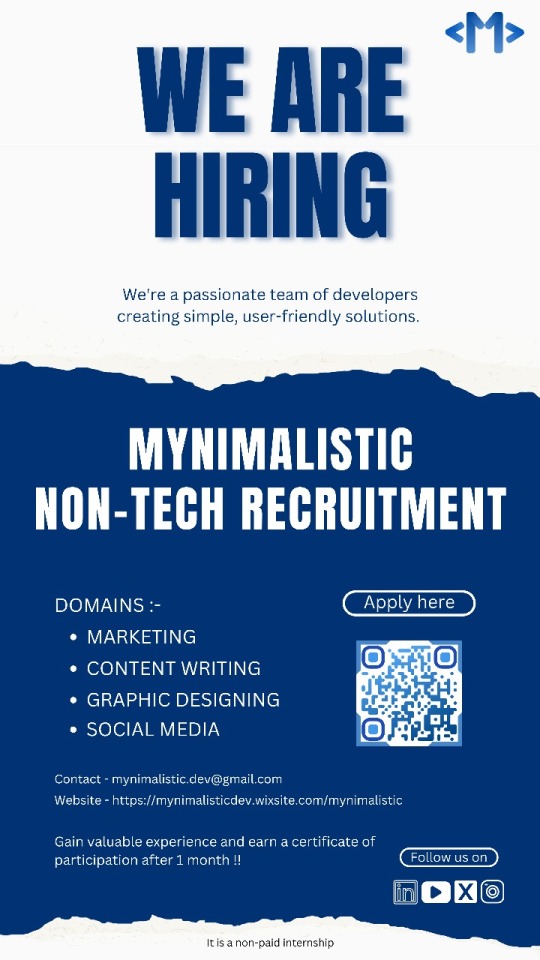
🚀 Join Mynimalistic as a Non-Tech Volunteer/Intern! 🚀
We're a passionate team of developers creating simple, user-friendly solutions. Gain valuable experience and earn a certificate of participation after 1 month!
🔗 Apply here: https://forms.gle/oEyqxmpvDiYxiWNB8
Domains:
Marketing Content Writing Social Media Graphics Designing
We would be excited to have you on board!
#non tech#marketing#digital marketing#graphic design#social media#content writing#internship#recruitment#appdevelopment#webdesign#userexperience#minimalistdesign#techinnovation#uiuxdesign#digitalsolutions#techforgood#startuplife#mynimalistic#cleandesign#problemsolvers#innovation#appdesign#webdevcommunity#makinglivessimpler
11 notes
·
View notes
Text
Tanzania Is Quietly Building a Digital Government – and It’s Actually Impressive 🇹🇿💻
Okay, so not many people are talking about it, but Tanzania has been making some real moves in digital transformation lately. The government’s platforms like ESS Utumishi (for civil service recruitment) and Ajira Portal (job applications) are going fully online — and they’re actually working.
They’ve got:
✅ Online government job listings ✅ Digital recruitment & application tracking ✅ e-Government services managed by e-GA (e-Government Authority)
Like, imagine applying for a public job without standing in endless lines or traveling miles to drop paperwork. That’s what they’re building.
It’s not perfect — rural internet access and system bugs are still issues — but it’s a pretty solid leap for East African public services.
Follow for us: essutumishi-tz.com
More countries should be watching what Tanzania is doing. 🛰️
#Tanzania#DigitalAfrica#eGA#ESSUtumishi#GovTech#AjiraPortal#EastAfrica#TumblrNews#TechForGood#CivicTech
2 notes
·
View notes
Text
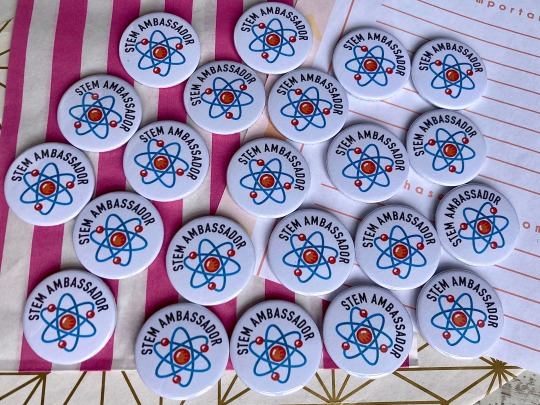
⚛️ 💙 STEM Ambassador Badges - great for STEM clubs and events at school
#stemclub#stemteacher#stem#ilovestem#stembadges#STEM#STEAM#WomenInSTEM#STEMeducation#GirlsInSTEM#Science#Technology#Engineering#Maths#STEMcareers#Coding#Robotics#EdTech#FutureEngineers#ScienceIsCool#TechForGood#Makerspace#badgemaker#stem2025#buttonbadges#koolbadge#buttons#craft#bbloggers#25mm
3 notes
·
View notes
Text
AI’s Role in Breaking the Internet’s Algorithmic Echo Chamber

Introduction: The Social Media Bubble We Live In
Have you ever scrolled through your social media feed and noticed that most of the content aligns with your views? It’s no accident. Algorithms have been carefully designed to keep you engaged by showing you content that reinforces your beliefs. While this may seem harmless, it creates echo chambers — digital spaces where we are only exposed to information that supports our existing opinions. This is a significant issue, leading to misinformation, polarization, and a lack of critical thinking.
But here’s the good news: AI, the very technology that fuels these echo chambers, could also be the key to breaking them. Let’s explore how AI can be used to promote a more balanced and truthful online experience.
Click Here to Know More
Understanding the Echo Chamber Effect
What Is an Algorithmic Echo Chamber?
An algorithmic echo chamber occurs when AI-driven recommendation systems prioritize content that aligns with a user’s previous interactions. Over time, this creates an isolated digital world where people are rarely exposed to differing viewpoints.
The Dangers of Echo Chambers
Misinformation Spread: Fake news thrives when it goes unchallenged by diverse perspectives.
Polarization: Societies become more divided when people only engage with one-sided content.
Cognitive Bias Reinforcement: Users start believing their opinions are the absolute truth, making constructive debates rare.
How AI Can Combat Social Media Bubbles
1. Diverse Content Recommendations
AI can be programmed to intentionally diversify the content users see, exposing them to a range of viewpoints. For example, social media platforms could tweak their algorithms to introduce articles, posts, or videos that present alternative perspectives.
Example:
If you frequently engage with political content from one side of the spectrum, AI could introduce well-researched articles from reputable sources that present differing viewpoints, fostering a more balanced perspective.
2. AI-Powered Fact-Checking
One of AI’s most promising roles is in real-time fact-checking. By analyzing text, images, and videos, AI can detect misleading information and flag it before it spreads.
Tools Already Making an Impact:
Google’s Fact Check Tools: Uses AI to verify information accuracy.
Facebook’s AI Fact-Checkers: Work alongside human reviewers to curb misinformation.
3. Intent-Based Content Curation
Instead of focusing solely on engagement, AI can prioritize content based on educational value and credibility. This would mean:
Prioritizing verified news sources over sensational headlines.
Reducing the spread of clickbait designed to manipulate emotions rather than inform.
4. Promoting Critical Thinking Through AI Chatbots
AI-driven chatbots can encourage users to question and analyze the content they consume. By engaging users in meaningful discussions, these chatbots can counteract the effects of misinformation.
Real-World Example:
Imagine an AI assistant on social media that asks, “Have you considered checking other sources before forming an opinion?” Simple nudges like these can significantly impact how people engage with information.
5. Breaking Filter Bubbles with AI-Powered Search Engines
Search engines often personalize results based on past behavior, but AI can introduce unbiased search results by ensuring that users see information from diverse perspectives.
Click Here to Know More
Future Possibility:
A browser extension powered by AI that identifies and labels potential echo chamber content, helping users make informed decisions about the media they consume.
The Future of AI and Online Information
AI has immense potential to transform the way we consume information. But the question remains: Will tech companies prioritize breaking the echo chambers, or will they continue feeding users what keeps them engaged?
What Needs to Happen Next?
Transparency in Algorithm Design: Users should know how AI curates their content.
Ethical AI Development: Companies must ensure that AI serves public interest, not just profits.
User Awareness and Education: People should understand how echo chambers work and how they affect their worldview.
Click Here to Know More
Conclusion: A Smarter Digital World
While AI played a role in creating echo chambers, it also has the power to dismantle them. By prioritizing diversity, credibility, and education over engagement-driven content, AI can make the internet a place of discovery rather than division. But this change requires collaboration between AI developers, tech giants, policymakers, and, most importantly, users like you.
Click Here to Know More
#AI#ArtificialIntelligence#EchoChamber#SocialMedia#TechEthics#Misinformation#FactChecking#DigitalAwareness#AlgorithmBias#FutureOfAI#TechForGood#AIInnovation#CyberCulture#OnlineTruth#MediaLiteracy#usa
3 notes
·
View notes
Text

sendin' out our heartfelt gratitude this season of thanks. from our family, team, and community to yours – thank you. we’re grateful to all of you who choose to spend your time and money with us as we try to be both a good cause and a good business. thank you for supporting adafruit, a woman-owned, open-source electronics manufacturer in brooklyn, nyc – usa -- ladyada, pt, and team 💖🙏🦃🤖
#adabox#openhardware#brooklynmade#opensourceelectronics#womenintech#adafruit#thankful#grateful#communitylove#makersmovement#innovation#smallbusinesslove#electronics#usa#supportlocal#techforgood#womenowned#nyc#thankyou
7 notes
·
View notes
Text
Transform Your Wealth: Explore Passive Income with Grass Today! 🌿💸
youtube
Unlock a new era of passive income with Grass! 🌐💸 Transform your idle internet bandwidth into a lucrative asset effortlessly. 🚀 Our groundbreaking network enables you to sell unused bandwidth to corporations and institutions, seamlessly running in the background of your phone or computer. 📱💻
Embrace the power of technology working for you, generating passive income from a resource you didn't even realize you had. 💰✨ Join the revolution of individuals earning effortlessly with Grass. 🌿🌍 Don't miss out on the chance to turn your connectivity into cash flow!
Ready to earn while you browse? Explore the possibilities with Grass now: https://tr.ee/WSW6J76BTg
#PassiveIncome#TechInnovation#NetworkEconomy#EarnFromHome#DigitalFuture#InternetSharing#SmartTech#GrassNetwork#TechForGood#ResourceSharing#DigitalEcosystem#InnovativeTech#ConnectivityRevolution#EarnWithGrass#TechForIncome#SustainableTech#HiddenAssets#TechInvestment
31 notes
·
View notes
Text

🚨 Wishing Zero Tolerance Day from Atikin Verse! 🚨
Let's stand together against injustice and promote a world free from violence and discrimination. Every voice matters! ✊🌍
#ZeroToleranceDay#EndViolence#AtikinVerse#SpeakUp#HumanRights#StopTheViolence#WetlandsDay#TechSolutions#SoftwareInnovation#DigitalTransformation#TechForGood#SoftwareDevelopment#CodeLife#TechEntrepreneur#InnovativeTech#FutureOfTech#DevCommunity#TechExperts#TechStartups#SoftwareSolutions#StandForChange
3 notes
·
View notes
Text
Hey Starbeams! ✨💖 Let's ponder something deep today. 🤔
Imagine AI could predict future actions perfectly. Is it ethical to use this to stop potential crimes before they happen? 🤔⚖️ Saving lives is amazing! 🦸♀️🌍 But is punishing someone for a predicted future action fair? 😟 Does it crush free will? 🕊️⛓️ Where's the line between safety and liberty? 🤯
Let's discuss! 💭💬

#AIethics#FutureTech#EthicalDilemmas#TechForGood#FreeWillVsSafety#ArtificialIntelligence#DeepThoughts#AI#ai girl#artificial intelligence#inspiration#shinebright#aijourney#emotionalintelligence#nlorastarbeam
2 notes
·
View notes
Text

Machine Learning isn’t just about data—it’s about transformation! The future of AI & ML is NOW—are you ready to innovate?
Source: businessinsider
3 notes
·
View notes